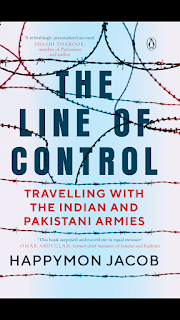BOOK REVIEW: REMARKABLE JOURNEY TO NO MAN’S LAND
Mukesh Devrari
Happymon Jacob’s new book ‘The line of control: Travelling with Indian and Pakistani Armies’ is an interesting story of his personal journey as a researcher. Although his another book titled ‘Line on Fire: Ceasefire Violations and India-Pakistan Escalation Dynamics’ has become a talk of the town because of his sensational revelation that 9/11 derailed Indian Army’s plan to capture Pakistani posts along LoC to end infiltration for once and all.
His less controversial book ‘The line of control: Travelling with Indian and Pakistani Armies’ tells the story of a man and his personal journey to study two rivals of South Asia and their conflicts. In this case, Professor Happymon Jacob has come a long way since the day he was advised by Hamid Ansari how to be a good repertoire. He has successfully entered the club of individuals who are out of power but continue to play a role in influencing opinion through negotiations and discussions with their counterparts in both countries. This track two diplomacy includes ex-heavy weights of politics, bureaucracy, and military who read and write about the Indo-Pak relations.
The first half of the book is entirely biographical. Jacob made 10 visits to Pakistan so far. On each visit, he must have had many experiences, but he highlighted his interactions mostly with powerful ex-bureaucrats and military officials. He did not mention his encounters with common folks. However, he was encouraged by the Pakistani military to interact with people living in Pakistan Occupied Kashmir who are facing the brunt of Indian artillery attack every now and then.
This book does not move in chronological order. The author does back and forth and chooses incidents as per the theme Jacob is addressing in particular chapter. It was also noticeable that he was carefully observing each and everything about the Pakistani army, their style, grandeur, and demeanour, on the other hand, he was comfortable and casual while talking with Indian forces.
This difference in approach was quietly palpable in his writing. This book is also full of remarks which express the deep convictions of the author about certain issues. At one place author says Pakistani armed forces rule Pakistan, on the other hand, Indian Army is struggling to remain relevant in policy matters even about security matters. It is true, completely subservient armed forces are the mark of deeply rooted democracy in any nation.
Half of this book is autobiographical. By the time you will finish half of the book, its tone and tenor changes considerably. It starts giving sermons and underlines ideals about how Indo-Pak relations, research, and the academic journey should be undertaken. He mentions ceasefire violations and their impact. His conversations and observations make it very clear that cross border firing can happen due to any reason. As armed forces are not accountable to the mayhem caused on other side, they can start firing anytime. There are no rules for engagement. Perhaps Happymon Jacob is the only person on the planet who has visited Line of Control from both sides. Perhaps he is also the last person to do it. No journalist or researcher will be provided even this symbolic tour to both sides of the border in the foreseeable future.
If India and Pakistan are two sides of the same highway which can never meet then we can safely conclude that Prof. Jacob is walking in the middle of the highway. Through his first non-academic writing he has made an appeal to the people who genuinely believe that peace between both nations is possible. He is also extremely critical of the portrayal of Pakistan in Indian media and vice versa as it vitiates the atmosphere and encourages leaders to take a hawkish line on Pakistan.
Author has also dismissed suggestions that special treatment by Pakistan military will change his views on the conflict. He insisted that irrespective of anything he would continue to serve the enlightened national interests of his country. He does not accept that identity in any way shapes his perspective on issues. It does not matter that he is Christian from Kerala and left-leaning professor. In the book, he also boasts that he is an agnostic who could not be persuaded even by Jesuits with the help of God, it is highly unlikely that Pakistani military will be able to turn him through its charm offensive.
One more thing is remarkable in his travelogue. If a high profile individual like Jacob is trailed and harassed by spooks (members of an intelligence community) who can line up Pakistani Army chief or for that matter Pakistani Prime Minister through his powerful friends and their friends, how Pakistani intelligence agency will treat common folks like us is not hard to imagine.
In this book, Prof. Jacob has also shown contempt for the concept of nationalism and national interests and described his perspective as a pursuit of enlightened national interest. Overall this book does not break any new ground in the continuing conversation about Indo-Pak relations. It also does not provide any new substantial information. Neither the book has developed any new perspective of seeing things.
At best this book is personal take of Prof. Jacob on wider issues while enjoying an official tour to Line of Control to learn about ceasefire violations.
end.




Comments
Post a Comment